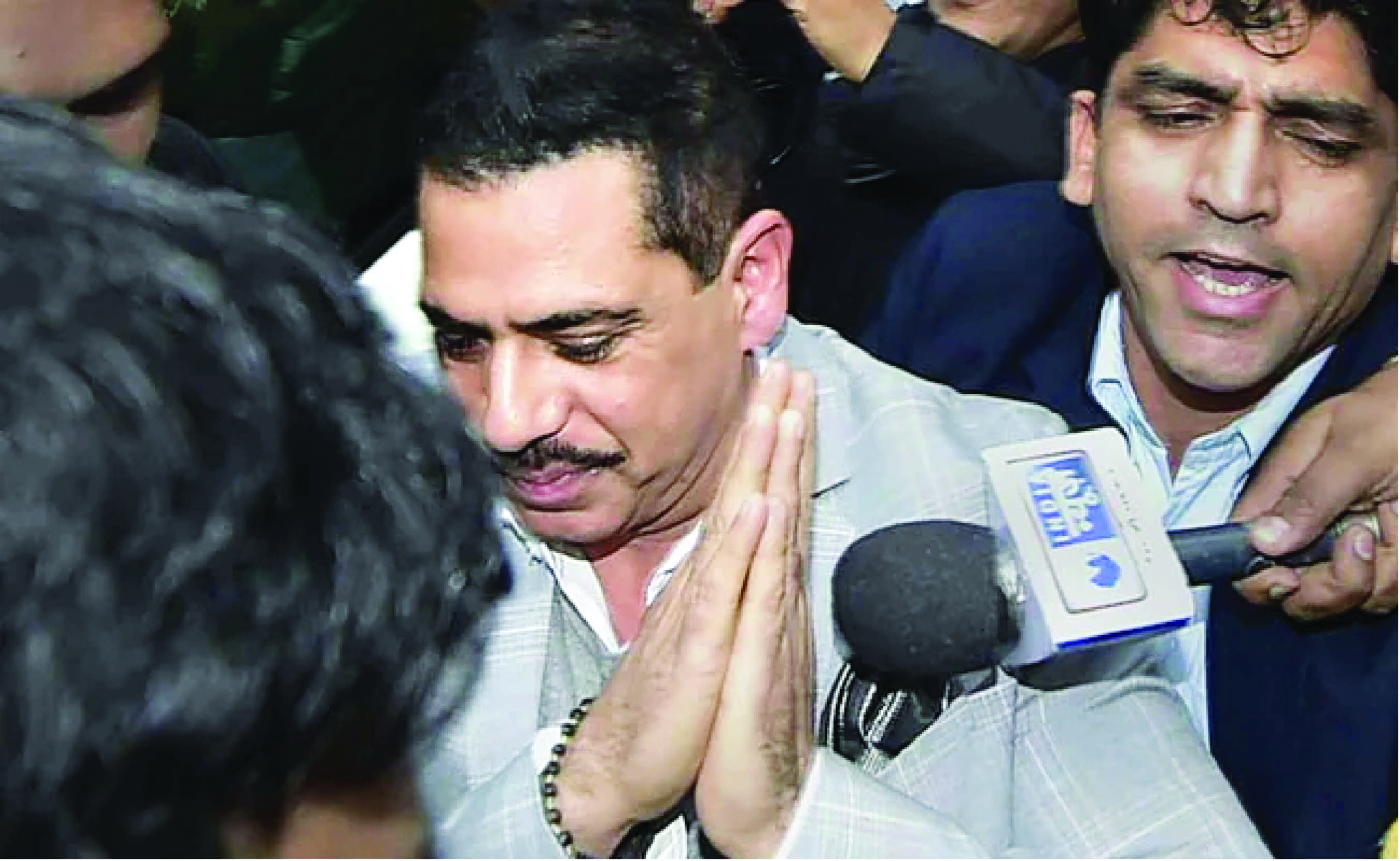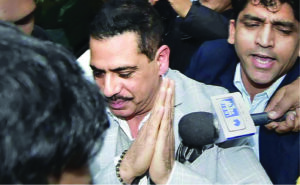Can Robert Vadra join the league of Firoze Gandhi in becoming the Nehru-Gandhi family’s son-in-law turned politician? Vadra, married to Priyanka Gandhi in February 1997, has been knocking at electoral politics door since October 2010 when he had boldly told The Times of India that he could win an election from anywhere: “I can definitely win (an election) from anywhere but I am a businessman. Why politics? I should be known for what I am,” he had said, continuing, “There is a time and place for everything. If I feel that I know enough about this line (politics), if I can dedicate enough time and effort to it, when my children are grown up and if I can make a difference, then why not?”
The “Why Not’ part is once again staring at the Congress leadership as posters of Vadra as the grand old party nominee have come up at Amethi.
The predicament before AICC president Mallikarjun Kharge and Sonia, Rahul and Priyanka Gandhi are two-fold. Vadra’s candidature is going to perpetuate dynasty charge. But more importantly, the winnability part is bothering 10, Janpath much more than factoring in ensuing memes, derision etc. It is an open secret that the Gandhis, India Alliance and ally Akhilesh Yadav have been working in close tandem to finalise nominees for two prestigious seats of Amethi and Raebareli which have been like family pocket boroughs of the Gandhi family. Rahul’s unanticipated defeat in 2019 Lok Sabha from Amethi has shaken the Gandhis to the core. Samajwadi party supremo Akhilesh Yadav has been pleading with Rahul and Priyanka to consider Amethi and Raebareli seats which go to polls on May 20.
Congress insiders say winnability is the crucial question as Gandhis [ Vadra included] can not afford to lose Amethi or Raebareli. According to them, if an informal poll survey being conducted by Congress’ in-house pollster Sunil Kanugolu indicates a thump up for the party, chances of Priyanka and/or Rahul jumping in fray from Amethi/Raebareli would go up drastically. Vadra, Congress insiders say, has a potential to lose out in both scenarios – i.e. if Gandhis are projected to be winning to losing in the informal poll survey as Vadra’s electoral fortunes are intricately linked to Gandhis.
Technically an apolitical entity and a private citizen, Robert Vadra has constantly been on BJP radar. Prime Minister Modi has himself described Vadra as “damadjee” and “RSVP” (Rahul, Sonia, Vadra and Priyanka) benefitting from 10 ten years of UPA rule.
But a quick recap to the past will be useful to explain why Sonia, Rahul and Priyanka are backing Vadra to the hilt. In 1997 when news of Priyanka getting married to Vadra became public, many were surprised by Priyanka’s choice. Vadra was son of a brass merchant from Moradabad. Vadra had not even gone to College after completing his A-level from the British School and some of his close relatives had strong links with RSS having donated their land and wealth to the Sangh.
But for Sonia, Priyanka marrying Robert was a continuation of family tradition. There was little in common between Jawaharlal Nehru and Kamla. Indira and Feroze. Sanjay and Maneka and even Rajiv and Sonia were drastically different in terms of stature and social circuits. By Sonia’s own admission, “our families could not have been more different.”
Within months of Priyanka’s marriage with Robert, Sonia had developed a great liking for her son-in-law. He was simple yet extremely confident. Robert was not enamoured by power that Gandhis wielded. Few can forget Vadra sporting ‘pink trousers’ when he went to cast vote with Priyanka on April 10, 2014 knowing fully well that hundreds of cameras would be waiting to take a snap.
But Vadra’s sartorial taste is one of the least problems for Gandhis. Away from public glare, in January 2002, Sonia had cautioned partymen not to do any ‘business dealings’ with Vadra’s relatives. Sonia was reportedly forced to take an unusual step after receiving many complaints that Vadra’s relatives were “misusing” her son-in-law’s name and seeking favour. Robert reportedly had many arguments with his brother, sister and father. Finally on January 4, 2002, Robert issued an advertisement in Times of India newspaper through lawyer Arun Bhardwaj. It read:
“It has been brought to the notice of my client that some persons including Rajinder Vadra (Robert’s father, now dead) resident of C-7, Amar Colony and Richard Vadra (Robert’s brother, now dead) resident of Basant Vihar Colony, Civil Lines Moradabad are misrepresenting to the public that they are working on behalf of my client (Robert Vadra) and allegedly promising jobs and other favours in return of money.
“Even though Rajinder Vadra and Richard Vadra are relatives of my client, they do not have access to my client. Public at large is hereby put to notice that my client has not authorised Rajinder Vadra and Richard Vadra and anybody else to work for him or to use his name in any manner and make such misrepresentation to anybody. Such misrepresentations are without the knowledge and consent of my client.”
Vadra’s family was outraged. Rajinder accused the Gandhis of “snatching away” his son. Domestic quarrels, defamation suits and legal notices became public. In his difficult period Sonia provided a lot of emotional support to Vadra.
Many decades ago, the Congress and Nehru-Gandhi family had another son-in-law who had contested the first general elections of 1951-52. Indira Gandhi had taken charge of the Rae Bareli parliamentary seat, where her husband, Feroze Gandhi was in the fray as a Congress nominee.
While, at one level, Nehru, Feroze, and Indira were staunch democrats, the roots of the rule of the dynasty were being sown. Feroze’s biographer Bertil Falk firmly believes that
Nehru’s son-in-law would have got the Congress ticket even if he was not married to Indira.
Feroze was a freedom fighter in his own right, having gone through four terms in jail. Within the Congress, he had powerful backers such as K.D. Malviya, Govind Ballabh Pant, Rafi Ahmed Kidwai, and Lal Bahadur Shastri.
According to Onkar Nath Bhargava, a friend of Feroze, when Jawaharlal Nehru came to campaign for Feroze in Raebareli during the 1952 polls, he seemed worried by Indira’s ill-health and curtly asked how many meetings the Congress candidate was addressing each day. Feroze was an unconventional politician. One night when he was campaigning, he stayed at the residence of his opponent from the Communist Party, had breakfast in the morning, and left again for campaigning.
As a parliamentarian, Feroze was constantly at loggerheads with prime minister Nehru. He flagged off a major financial scandal known as Mundhra scam that resulted in the union finance minister, T T Krishnamachari’s resignation and the accused Haridas Mundhra getting jail term for 22 long years.
Mundhra was accused of convincing a nascent Life Insurance Corporation of India into investing rs 124 lakhs in shares of six sinking companies in which he had the interest. In the subsequent investigations, Krishnamachari and then union finance secretary H M Patel were charged with crossing the line for pushing for the LIC investment in Mundhra’s six companies.
In the Mundhra scandal, the role of prime minister Nehru was significant and in sharp contrast to the way subsequent prime ministers from Indira Gandhi, P V Narasimha Rao to Atal Bihari Vajpapee dealt with the issues of alleged economic irregularities. Nehru was quick to secure his finance minister’s resignation and appointed M C Chagla, a former chief justice of Bombay to inquire into the scandal. Chagla, a jurist who later served as union minister under both Nehru, Lal Bahadur Shastri and Indira Gandhi, held Patel, the then union finance secretary, and two LIC officials colluding on the payment.














